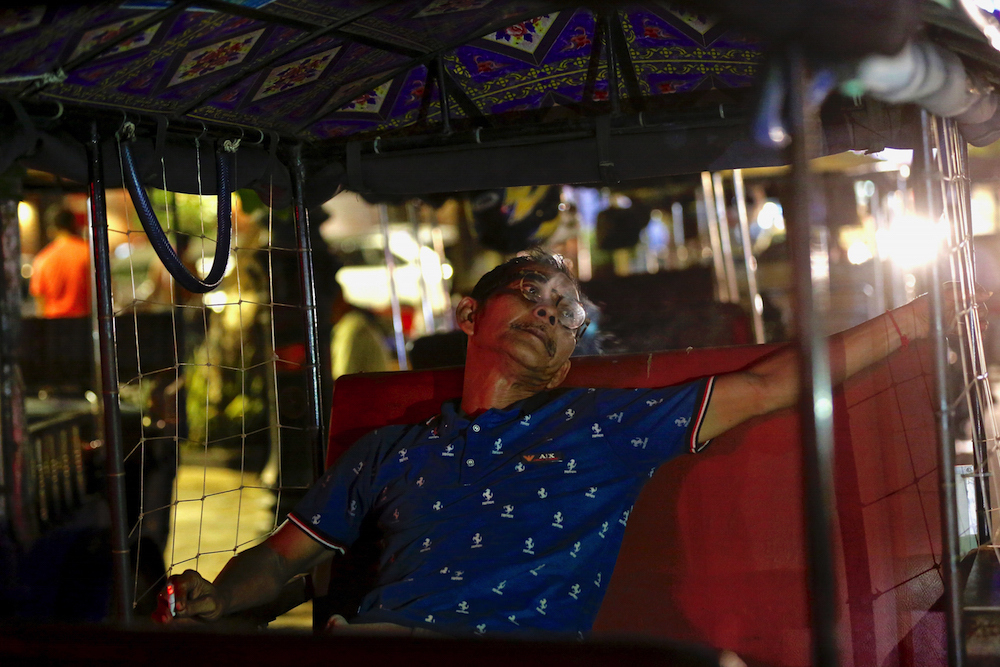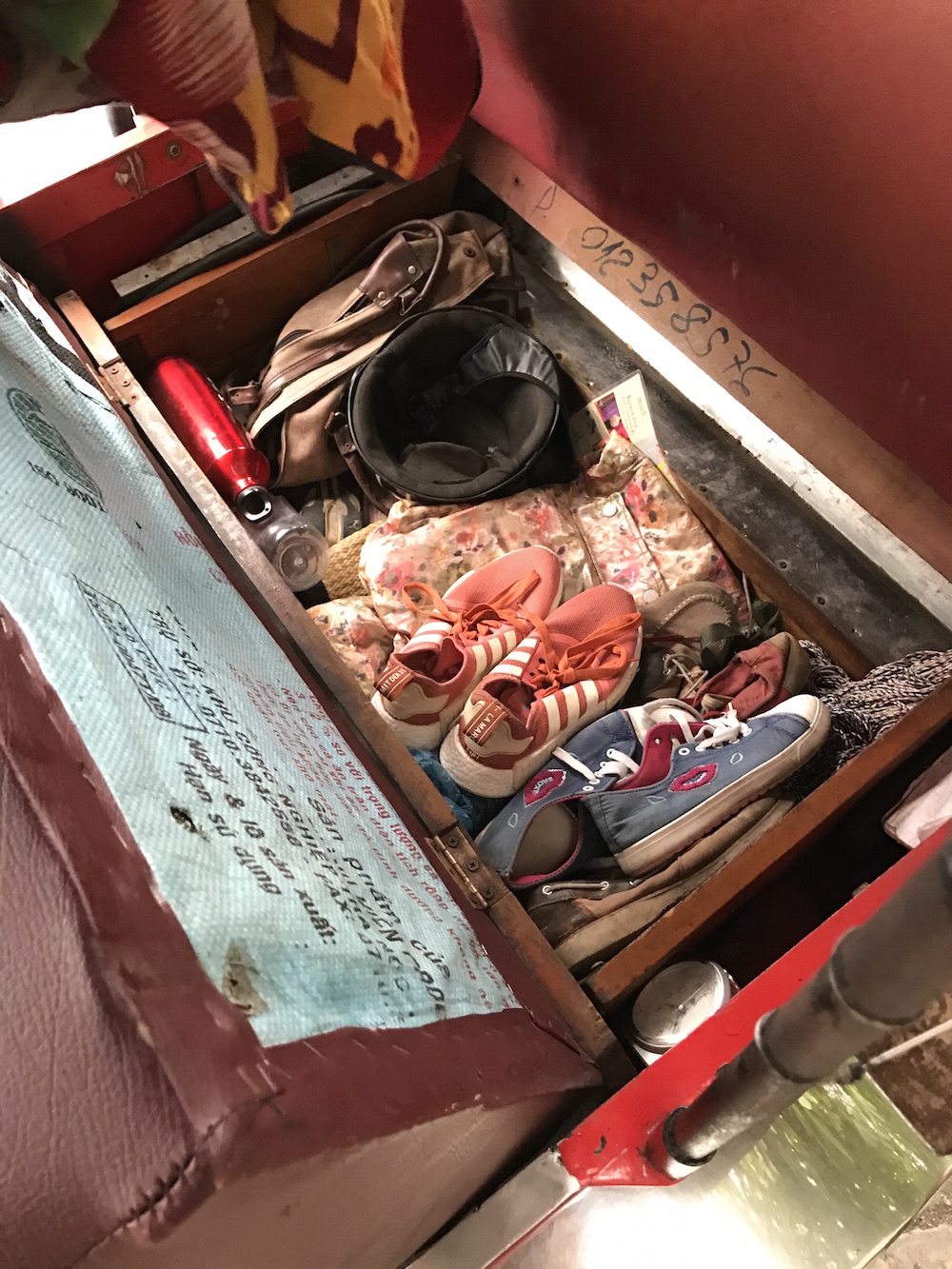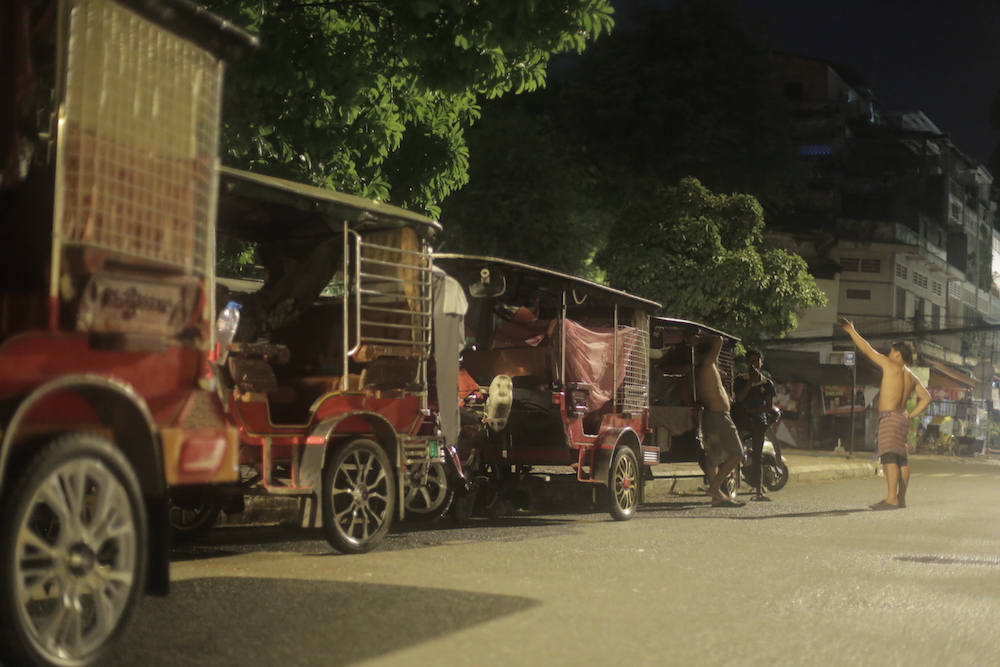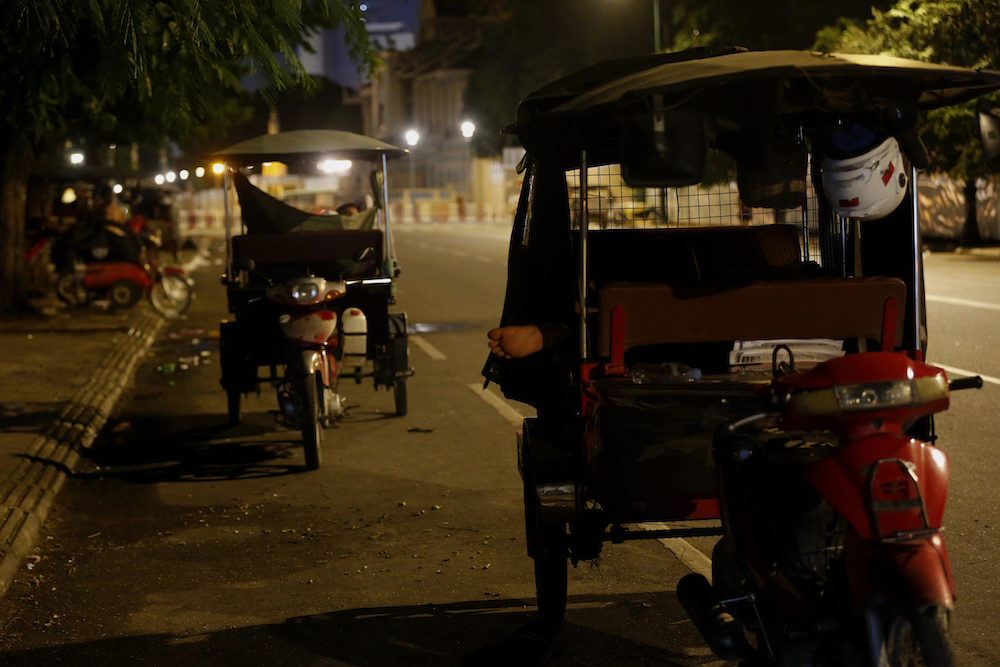
The Tuk-Tuk Dwellers
It’s a hard life for some tuk-tuk drivers in Phnom Penh, fighting for customers and a living, and often sleeping in the vehicles they call home.
By Anandha Loustau
August 18, 2017
Night has fallen across Phnom Penh and the city is winding down. It’s 10 p.m. and the bustle of the riverside is subsiding as tourists drift back to their hotels and residents make their way home.
So Maly is preparing to settle down for the evening after a grinding day at work. His tuk-tuk is parked in its usual spot near the Foreign Correspondents’ Club, where he picks up fares during the day and nods off at night.
The 43-year-old has slept in his tuk-tuk for the two years that he’s been earning a living ferrying visitors and locals around the city. Like many of his fellow tuk-tuk drivers, he can’t afford accommodations.
“I don’t have money for rent,” he says with a shrug.
So his tuk-tuk has become his home. He plays cards, chats with friends, phones home, eats and sleeps in the vehicle.
After dark, groups of drivers can be found parked on the curb in the shadows of the National Museum, lined up along the road leading to the Royal Palace, and tucked down alleyways. People pass them, but rarely give them a second glance. They’re invisible men.
“Hammock, mosquito net, clothes, money under the seat, because this is my home,” says Yoeun Yeat, showing off the modest possessions stored in his tuk-tuk parked on Street 13, just south from the museum.
As the falling rain begins to intensify, Mr. Yeat, 32, of Prey Veng province, and his fellow drivers jump into the shelter of their vehicles. His neighbor, Sum Phally, hangs his clothes on the side of the tuk-tuk, walking shirtless in the pouring rain. By early morning, he figures, the sun will have dried his laundry.
Most of the capital’s tuk-tuk drivers are from the provinces, enticed by the hope of a steady income and the possibility of a better life. Those who sleep on the street have left their families behind.
The largest tuk-tuk association in the country, the Independent Democracy of Informal Economy Association, says there are about 10,000 tuk-tuk drivers working in Phnom Penh and 6,000 in Siem Reap. Cambodia’s economic boom has seen a rise in migrants making their way to the cities, intensifying the competition among tuk-tuk and motorcycle-taxi drivers.
—

Mr. Maly, originally from Kratie province, had bigger dreams than most. “I wanted to be a lawyer,” he says, drawing heavily on the ever-present cigarette that either hangs from his lips or nicotine-stained fingers.
He finished four years of legal studies at the Royal University of Law and Economics in Phnom Penh in 1993, a time of change for Cambodia.
“The election came up, it was unstable, I had no money to spend on lessons, books,” he says. “I had no other choice but to look for a job so I used my moto.”
Later, he hooked a trailer to the motorbike so he could sleep on it too, sparing the cost of rent. It served him well for nearly two decades.
Today, Mr. Maly easily recalls his younger self and the distant ambition to which he once clung. With no alternatives or savings, he has little prospect for a home beyond the tuk-tuk he rents for $3 a day.
His days are a repetitive struggle. His routine rarely varies. He starts at 7 a.m. when he wakes and heads to wash at the public toilets across from the Royal Palace, paying 500 riel, or about $0.12, to use them. Then it’s time for a quick breakfast of chicken and rice for about 5,000 riel, or about $1.25.
The hustle for customers at the Foreign Correspondents’ Club, once an actual meeting place for journalists but now a bar and restaurant favored by tourists, starts early. He says it can be boring waiting around for fares. The hours stretch on.
On a good day, Mr. Maly pockets about $20. On a bad day, he makes nothing.
—
Despite how it may appear to outsiders, attracting customers is not a free-for-all. Tuk-tuk drivers have strict rules governing how they operate, Mr. Maly says. A senior driver, a former police officer, acts as team leader for a territory that stretches some 20 meters along Sisowath Quay.
“In 24 hours, we have a team and each tuk-tuk has a number from 1 to 24 and each goes in order of the number,” Mr. Maly says.
If a driver declines a fare, for whatever reason, he must wait to pick up a customer until the entire number sequence has been called and a new one begins. If business is slow, the process can take all day.
The system means the drivers are very territorial, and there’s a penalty for those who fail to follow the rules.
“We have an unwritten code that we cannot start arguments here and if you do not respect the rules, we won’t let you come here for three days,” he says.
Of the 24 drivers in the group, Mr. Maly is one of five who sleep outside in their tuk-tuks. Exposed and vulnerable, they don’t always sleep easy. Mr. Yeat once had his clothes stolen during the night. Mr. Maly lost his mobile phone to thieves at about 1 a.m.

“People came and searched my pockets and stole my phone,” he says. “They came with two to three motos, and I couldn’t scream out in time.”
During the rainy season, the drivers are often damp and cold. It can also be lonely.
For Mr. Maly, the disappointment of quitting law school and the fear of being robbed are dwarfed by his inability to see his wife and 12-year-old daughter, who are both in Kratie province.
“I miss them. I would see them once a year, but I have no choice. I need to pay my $3 rent each day, so it is very expensive to go home and not earn any money,” Mr. Maly says.
If they moved to Phnom Penh, he jokes, then all three of them would need to live in his tuk-tuk. Yet his laughter soon trails off. He doesn’t know if his wife is sad that he is “so far away,” he adds, reaching for another cigarette. Perhaps his wife has grown indifferent toward the situation, he says, in the decade since their daughter’s birth.
“Drinking helps me forget my problems and loneliness,” says Mr. Maly, opening a second can of Angkor beer. Alcohol is a coping mechanism against a life that has fallen short of his expectations.
Soft spoken, Mr. Maly, who speaks a little English, is polite and neat in his appearance. Reserved at first, he later opens up to talk about his life. He looks after his tuk-tuk with pride, wiping the seats, frequently washing the exterior, and trying, as best he can, to transform it into a home, with small comforts like a hammock and blanket under the back
seat.
He fears harder times ahead with tourism shifting away from tuk-tuks to taxis, tour buses and visitors who prefer to explore on foot. He intends to send at least $30 a month to his family for as long as he can.
About 50 meters down from his patch lies another territory. Lim Sarak, a 32-year-old driver from Svay Rieng province, is a member of this group, which is less stringent and accepts newcomers. “We have a separation, from FCC to riverside… FCC to here is us,” he says. Sitting in his back seat, staring at his iPhone screen, he adds, “They split up the territory a long time ago. It was already in place when I arrived 10 years ago.”
While there are several tuk-tuk associations in the country, there are no official regulations governing the industry. Instead, driver groups have their own code to which they must all adhere. Those in Mr. Sarak’s group of 20 drivers, for instance, have a tacit agreement not to steal each other’s passengers.
Mr. Yeat quotes the veteran drivers, whose wise words soothe tempers oiled by Khmer whiskey: “Please don’t have arguments with each other while drinking. Please avoid any arguments.”
—

Mr. Sarak began sleeping in his tuk-tuk to save the $100 a month he was spending on rent and electricity bills. He doesn’t have a wife or family to support, which alleviates some pressure to make money.
At night, his group parks where they can find a spot. They bed down around Sothearos Boulevard, near the Unesco office. Some sprawl in their tuk-tuk’s cab, still dressed in their clothes from the day, a leg or foot hanging over the side.
Mr. Sarak hasn’t encountered any problems living on the streets and the group, which includes his cousins, have each other’s back. “We look out after each other,” he explains.
He pockets about $10 a day, but he displays a certain sense of despair toward his trade.
“I really enjoy this job because I cannot do anything else but this,” he says.
—
As the sun starts to creep up in the sky, the drivers by the National Museum are stirring. Mr. Yeat is already awake, rising as early as 5 a.m., beginning with a wash before making his way to Phsar Kandal for breakfast.
His daily income ranges from $7.50 to $10, though sometimes he can make $20.
He returns to his usual parking spot about 7 p.m. The next two hours are spent drinking, swapping stories and doing household chores, such as washing clothes and tidying tuk-tuks.
“We are all like brothers here… we come from the same province,” says Mr. Yeat, sitting on the backseat of his tuk-tuk.
The drivers from Prey Veng have an easy familiarity with each other. They have become each other’s family, and the bond of companionship is like a brotherhood. When night falls, newcomers are welcome to pitch up nearby to sleep.
Mr. Yeat first worked as a cyclo driver before moving to Thailand in 2013 to work in a battery factory. Three years later, he returned to Cambodia to be closer to his family, Svay Antor district rice farmers. He has two children, a boy, aged 8, and a baby girl, whom he visits every two
weeks.
“I chose to become a tuk-tuk driver because it is not too far away from my family and I get to see them often,” he says.
In Phnom Penh, being a tuk-tuk driver might be viewed by some as a lowly profession, but in his province, Mr. Yeat is considered to have made something of himself. “It is famous in my hometown that you will get benefit being a tuk-tuk driver,” he says.
Despite the challenges, Mr. Yeat, who never studied past grade 8 and does not speak English, is happy in his work. “I really enjoy it because I have no education,” he says. “I have found no other skill except this one.”
As the riverside quiets down, Mr. Yeat and his fellow drivers turn in. If times become harder, they all face more nights like this to come.
Further along the road, Mr. Maly is having a last cigarette before trying to sleep, the smoke drifting around his head and then up into the night.
“I want to look for different opportunities, but I have no money to start,” he says. “I have no other goals and there is no other way except this business.”
(Additional reporting by Sek Odom)



